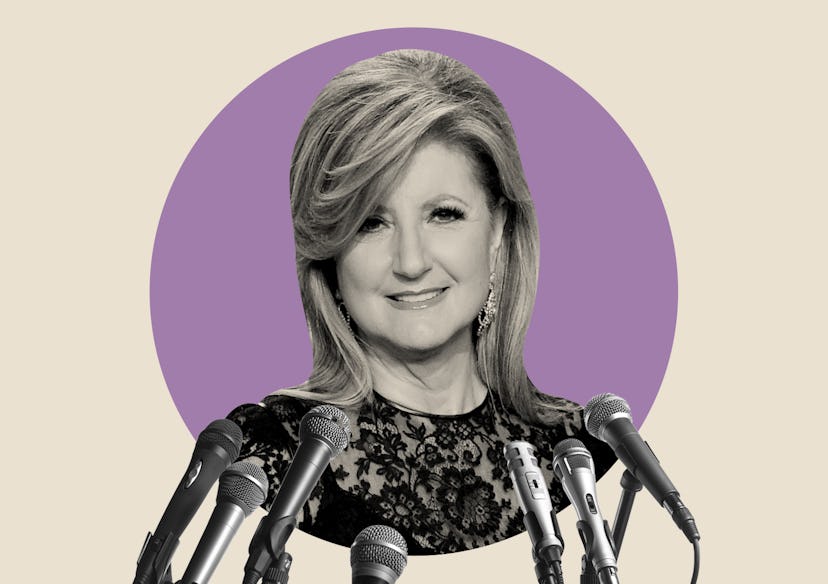Quick Question
Arianna Huffington Beat Burnout — And You Can, Too
“I’d bought into this delusion that in order to succeed I had to accept burnout as the price I had to pay.”

In Bustle's Quick Question, we ask women leaders all about advice — from the best guidance they've ever gotten to what they're still figuring out. Here, Arianna Huffington tells Bustle about her new book, her worst habits, and how she avoids burnout.
Arianna Huffington knew something had to give. It was 2007 and balancing raising her teenage daughters with building HuffPost had left her stretched thin. Then she woke up in a pool of her own blood. “I’d bought into this delusion that in order to succeed I had to accept burnout as the price I had to pay to be a great founder of HuffPost and to be a great mom,” Huffington tells Bustle. “I ended up collapsing and that was the beginning of me recognizing that sleep deprivation made me less productive, less effective, less happy.” The Thrive Global founder had broken her cheekbone and got several stitches above her eye; but the unfortunate accident prompted Huffington to start a wellness journey that ultimately led to the publication of her latest book.
Your Time to Thrive — which was written by the editors of Thrive Global, led by the brand’s Head of Content Development, Marina Khidekel — is a much-needed manual for combatting burnout. Focusing on Microsteps (tiny, science-backed changes you can make to your daily routine), Thrive is all about helping readers build newer and healthier habits, be it taking time to reset, changing up your sleep routine, or focusing on your breath. Because as Huffington puts it, “[It’s] through the small moments in our day we can really change our lives.”
Below, Huffington meditates on the review that compared HuffPost to Gigli, how to spot burnout, and the advice she wishes she could give her younger self.
Your Time to Thrive introduces readers to the genius idea of “Microsteps.” What are some of the most important — and surprising — microsteps that you incorporate into your daily routine?
We have this Microstep which is [the] “reset.” [It’s taking] 60 seconds at different times in your day [to reset]. Like first thing in the morning, before you go to your phone, take 60 seconds to focus on your breathing and set your intention for the day. Then during the day take 60 seconds between Zoom calls to stretch, to walk around your kitchen table, or your desk. Take 60 seconds after you get a stressful piece of news. Don’t just go straight onto the next thing.
Microsteps are meant to help women combat burnout. But not all signs of burnout will be quite as obvious as your experience of collapsing. What warning signs should women look out for?
The feeling of being depleted, running on empty. The feeling that you have to power through to do all the things on your to do list and schedule. Another is feeling negative about your life and cynical about your job. A third thing is [when] you find yourself being much less productive, because whatever you have to do [is] taking three times as long [as normal].
In the book you write about turning 70 this summer and celebrating by revisiting your journals from earlier on in your career. What did you learn from looking back?
[The journals were from] 2007 and the world has changed a lot, but at the time the glamorization of powering through sleep deprivation was much more universal. Now we have a lot of very successful business people talking about how much sleep they need to be a successful leader. Jeff Bezos wrote on Thrive that he needs 8 hours to make the best decisions he can make. Or we have elite athletes like Tom Brady talking about [how] getting 9 hours of sleep [helped him with] winning the Super Bowl at 43. So the world has changed dramatically.
What advice would you give your younger self in those journals?
Stop worrying so much and stop judging myself so much. So many of the worst things we do in our lives are based in not loving ourselves enough, not forgiving ourselves, and judging ourselves.
What’s the best piece of advice you’ve ever received?
It’s definitely from my mom. She used to say, “Failure is not the opposite of success, but a stepping stone to success.” I say that’s the best advice because especially women, we tend to feel very afraid of taking risks because we’re very afraid of failing. But if we can just see failure as part of everyone’s life when they try things, then it takes some of that pressure off and we’re more willing to live a fuller life and follow our dreams.
Have you ever experienced a failure that turned out to be more of a stepping stone than a setback?
I have had so many failures. Some of them were real failures — like my second book being rejected by 36 publishers — and some of them were perceived failures, like HuffPost launching to terribly negative reviews. One of them I remember by heart. It said, “The Huffington Post is the movie equivalent of Gigli and Heaven’s Gate rolled into one.” So I think people who have succeeded need to talk more about their failures.
This interview has been edited and condensed for clarity.
This article was originally published on